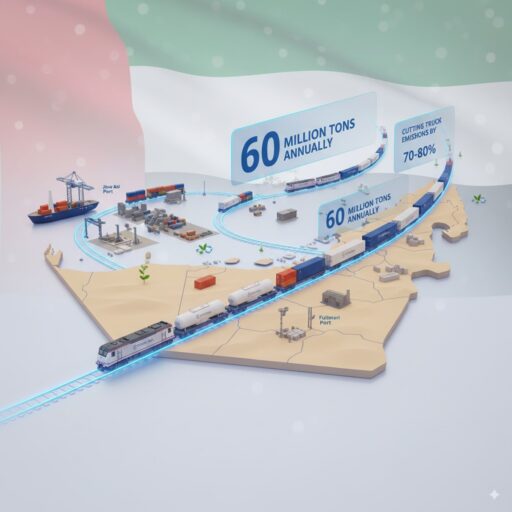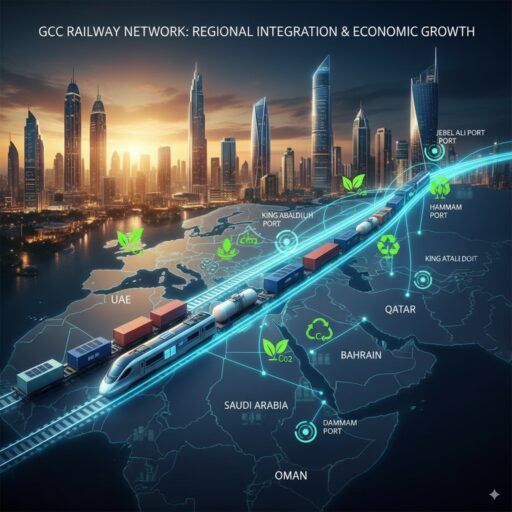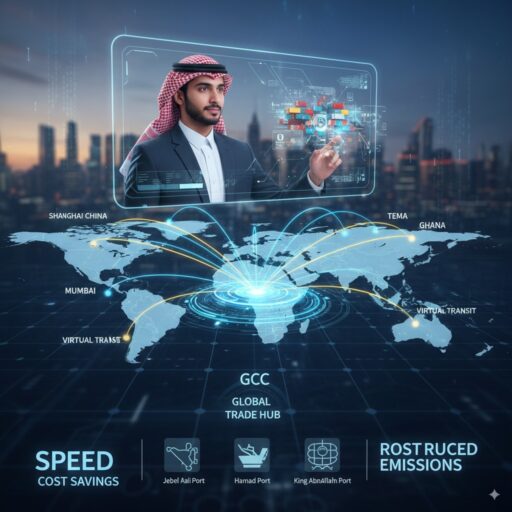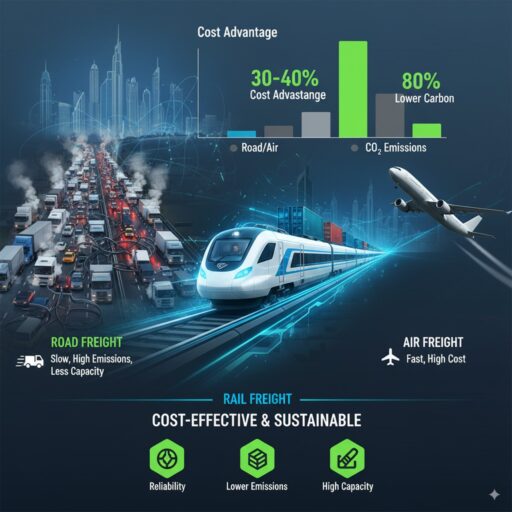
Railways are often seen as the backbone of trade in Europe, India, and China. But in the Gulf Cooperation Council (GCC), where sea and air transport have traditionally dominated, railway logistics is now emerging as a game-changer.
With mega-projects like the GCC Railway and Saudi Arabia’s Vision 2030 logistics corridors, the region is preparing for a future where rail freight will complement ports, airports, and road networks — creating a multimodal, sustainable, and cost-efficient supply chain.
🌍 Why Railways Matter for GCC Logistics
The GCC economy is built on trade. Currently, most cargo moves by:
-
Sea Freight (ports like Jebel Ali, Dammam, Sohar)
-
Air Freight (Dubai, Doha, Riyadh — global air cargo leaders)
-
Road Transport (trucks carrying cross-border goods within GCC)
But here’s the problem:
-
Roads are congested and limited in capacity.
-
Air freight is fast but very expensive.
-
Sea freight is efficient but slow for regional distribution.
That’s where rail logistics steps in.
Key benefits of rail for GCC freight:
✔ Faster than sea, cheaper than air
✔ High-capacity cargo movement (minerals, oil, containers)
✔ Lower carbon emissions — aligned with ESG and sustainability goals
✔ Reliable schedules unaffected by road congestion
🚆 The GCC Railway Project

The GCC Railway is one of the most ambitious infrastructure projects in the region.
-
Length: 2,117 km
-
Countries: Linking UAE, Saudi Arabia, Oman, Qatar, Bahrain, and Kuwait
-
Cargo Role: Designed for containerized cargo, petrochemicals, and bulk goods
-
Connectivity: Ports, industrial zones, and free zones will directly connect to the railway
Impact:
-
Reduce truck traffic on highways
-
Enhance regional trade integration
-
Position GCC as a global logistics hub connecting Asia, Africa, and Europe
🇸🇦 Saudi Arabia: Rail Leading the Way
Saudi Arabia is making massive investments in rail freight under Vision 2030:
-
Expanding the North-South Railway (2,750 km) for minerals and cargo
-
Building connections to NEOM and mega-projects in the Red Sea
-
Integrating rail with ports like Jeddah Islamic Port and King Abdullah Port
The focus is on creating a national logistics hub where rail plays a central role in connecting ports, cities, and industrial zones.
🇦🇪 UAE: Etihad Rail
The UAE is already operational with Etihad Rail:
-
Phase 2 connects Ghuweifat (Saudi border) to Fujairah (East coast)
-
Links key ports: Jebel Ali, Khalifa, Fujairah
-
First cargo carried: sulphur from Abu Dhabi
-
Future role: containerized goods, manufacturing, e-commerce, and cross-border GCC cargo
Etihad Rail is expected to carry 60 million tons annually, cutting truck emissions by 70–80%.
📦 What This Means for Businesses
Rail logistics in GCC opens new opportunities for freight forwarders, SMEs, and corporates:
-
Lower Costs
Rail is 30–40% cheaper than road freight for bulk cargo. -
Speed + Reliability
Consistent schedules for regional deliveries (compared to unpredictable road traffic). -
Sustainability Advantage
Rail emits up to 80% less CO₂ than trucks — a huge benefit for companies with ESG reporting obligations. -
New Trade Lanes
China-Europe rail corridors have already proven successful. The GCC can replicate this model, connecting Gulf ports with Africa, Central Asia, and Europe.
⚖️ Challenges Ahead
Of course, rail logistics in GCC isn’t without obstacles:
-
High infrastructure costs – multi-billion-dollar investments required
-
Inter-country coordination – GCC rail timelines vary by nation
-
Technology integration – aligning customs, digital platforms, and cargo tracking
-
Market adoption – businesses need to shift mindsets from road-dominant freight to multimodal solutions
🚀 The Future: Rail as the Backbone of GCC Supply Chains

By 2030, the GCC could see:
-
Fully integrated multimodal logistics hubs (sea-air-rail-road)
-
Dedicated rail freight corridors for oil, petrochemicals, and containers
-
E-commerce logistics powered by rail for faster cross-border delivery
-
A measurable reduction in carbon footprint across regional supply chains
For freight forwarders and SMEs, this means new business models:
-
Offering rail-inclusive solutions to clients
-
Partnering with Etihad Rail or Saudi Rail to secure capacity
-
Providing digital visibility tools for multimodal shipments
📌 Final Word

The GCC has relied on sea, air, and road for decades. Now, rail logistics is set to complete the puzzle — offering speed, cost savings, and sustainability.
Rail won’t replace other modes. Instead, it will integrate them into a seamless supply chain, making the Gulf one of the most advanced logistics hubs globally.
At Al Furqan Shipping & Logistics Dubai, we are preparing our clients for this transition by offering multimodal solutions that include rail, ensuring cost-efficiency, compliance, and visibility.
👉 The question is not whether rail will transform GCC logistics.
It’s whether your business will be ready when it does.
📞 Contact us: +971-52-890-9989
🌍 Visit: www.alfurqanshipping.com

